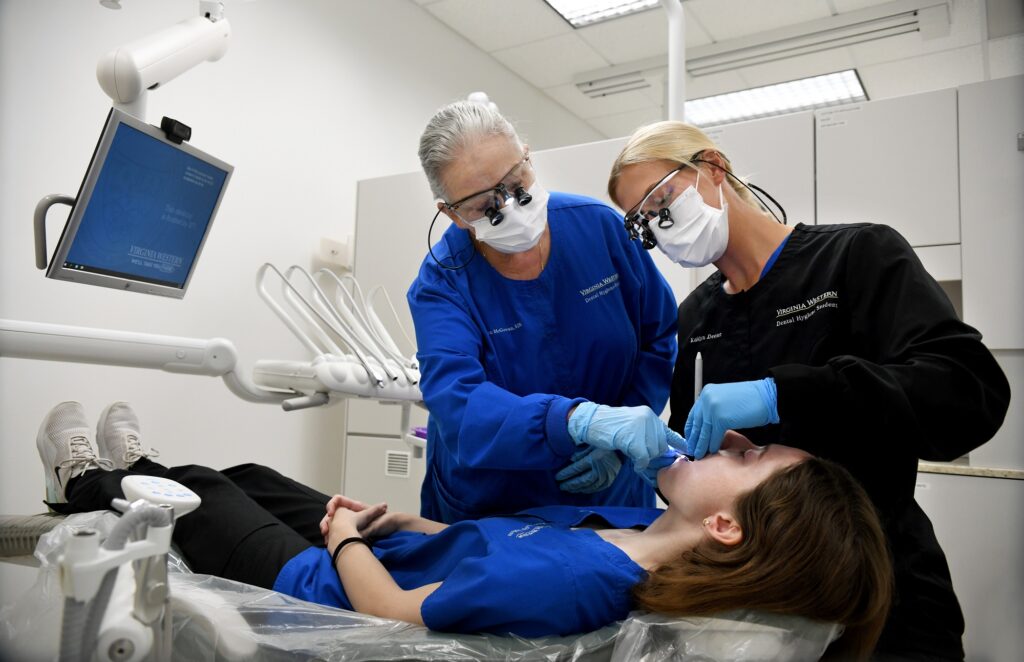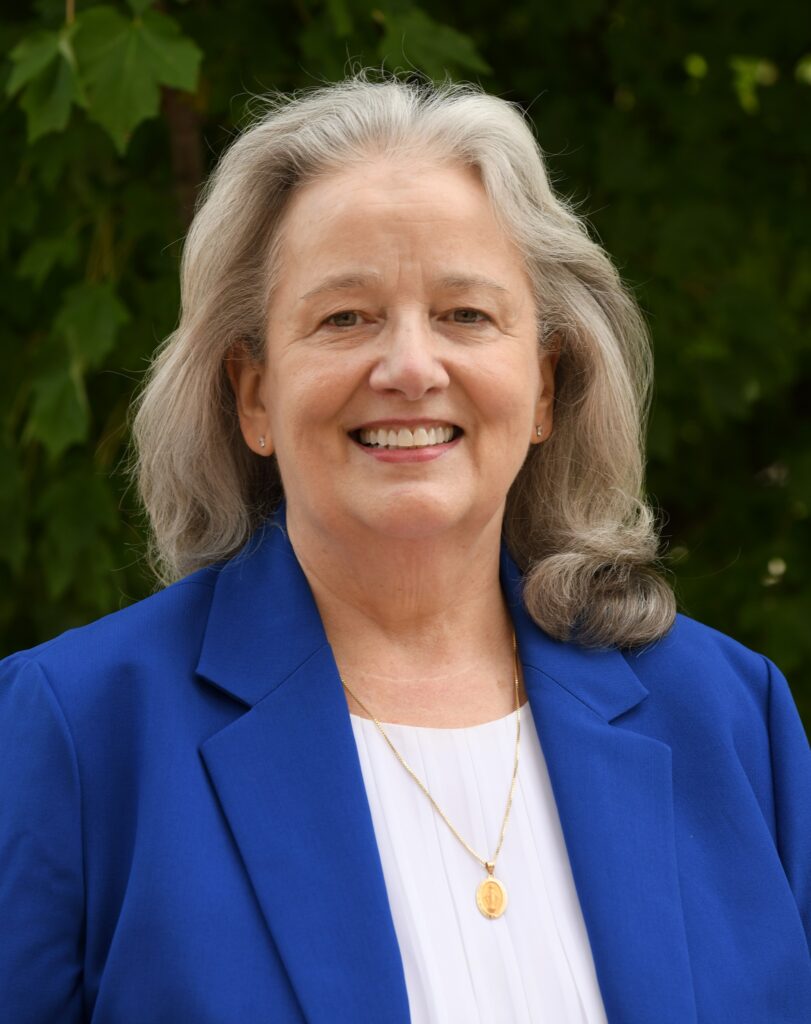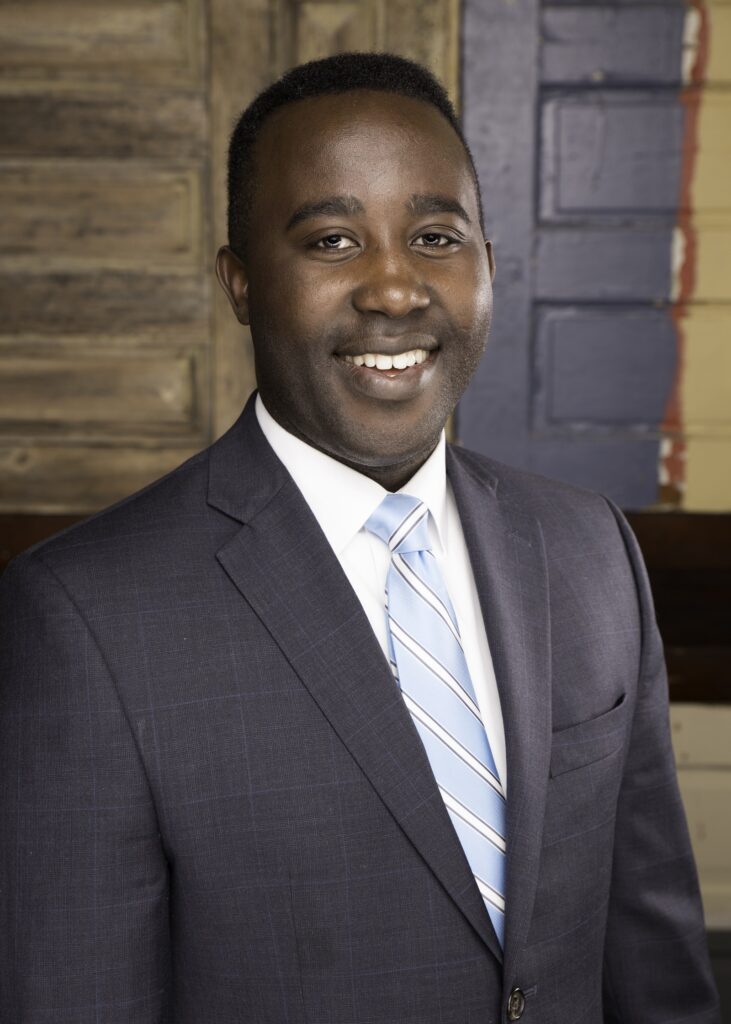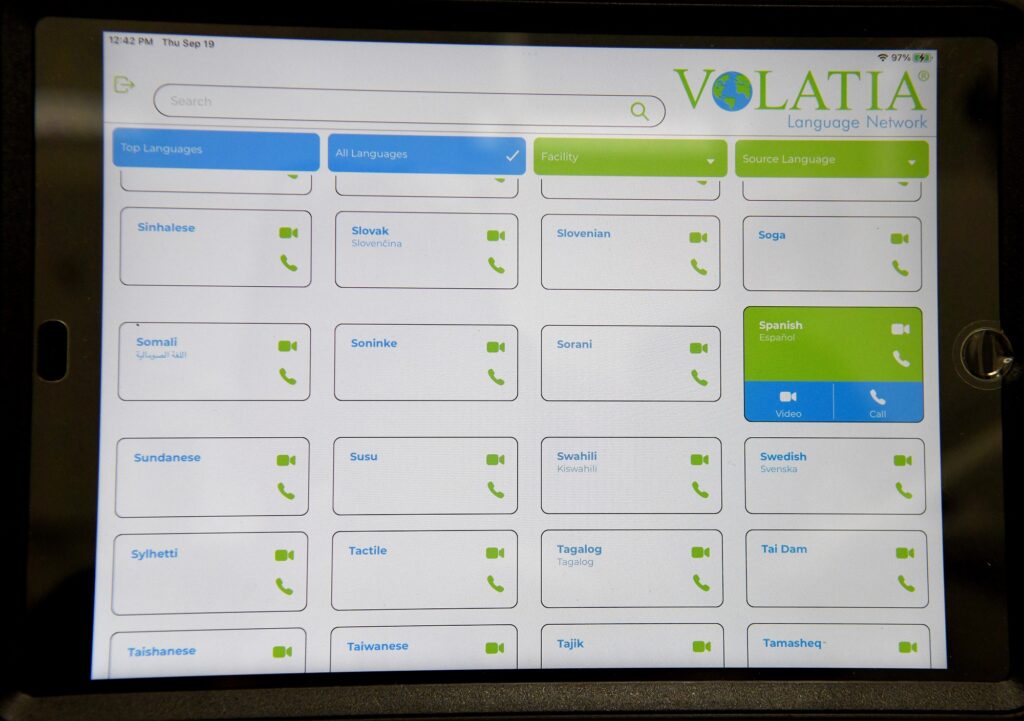By Allison Taylor
Students, faculty, and staff of Virginia Western’s Dental Hygiene Clinic are all smiles thanks to an Innovation Grant that made it possible for the program to secure a translation service to better serve patients who speak languages other than English. The grant was awarded to the Dental Hygiene Program in June 2023, and students began using the translation service, Volatia Language Network, in spring 2024.

The Dental Hygiene Clinic on campus provides free preventive oral health services to the community, often providing access to care for underserved populations that may otherwise go without. The clinic is open weekly during the academic year, though hours can vary according to program schedules each semester. Currently, each student is required to treat a minimum of 37 patients; the graduating class of 2024 treated a total of 641 patients. The Dental Hygiene Program also has extended campus sites at Danville Community College and Laurel Ridge Community College, both of which operate their own dental clinics and have their own clinical instructors. Preventive services may include dental cleanings, X-rays, sealants and fluoride treatments.
“Dental care is expensive, and so a lot of people go without. We try to reduce that barrier and give more people access to care,” said Colleen McGowan, Dental Hygiene Clinic Coordinator. “We want people to come in because taking care of your oral health can help with your overall health. Even things like toothaches; let’s say a child has a toothache. They miss school, a parent has to stay home, they get behind … it’s not just a toothache, it reaches into other parts of your life.”
Factors such as cost or lack of insurance prohibit many people from seeking oral health services, which can lead to long-term health issues. According to the World Health Organization, there are links between a person’s oral health and overall health. For example, periodontal disease, which affects the gums, has been associated with other health conditions such as diabetes and high blood pressure. One of the risk factors for developing oral health conditions is lack of education about proper oral hygiene. Students and faculty at the Dental Hygiene Clinic encourage patients to ask questions and strive to minimize any anxiety a patient may be feeling. Patient education and comfort are top priorities, but this can become challenging when facing language barriers.

According to McGowan, in the past, students or faculty who were fluent in Spanish have helped students communicate with Spanish-speaking patients, but students and faculty were still limited in their ability to communicate with patients who spoke other languages. In addition to Spanish, the most common languages spoken in the Roanoke Valley are Nepali, Arabic, Dari, Haitian Creole and Swahili.
“We couldn’t even really get those patients in the door; we couldn’t make an appointment,” said McGowan, “so even that has been huge. In an academic setting, we really wanted to be able to talk and to build relationships with the patients.”
The Dental Hygiene Department was awarded just over $7,500 through the grant, most of which went toward translation minutes for calls on the Volatia app, and a small portion of the funds were used to purchase iPads, which allow students to contact translators via video call or phone call.
Innovation Grant funds are set aside by the Virginia Western Educational Foundation for the purpose of inspiring new and creative ideas that will enhance the educational experience of students. The ability to provide resources and opportunities to meet a need helps bring the ideas of faculty and staff to life. Innovation Grant opportunities are available annually each fall. During the 2023-2024 grant application period, the Dental Hygiene Department’s idea to provide translation services to patients was the only student-led initiative. Students of the Dental Hygiene Program were inspired when they noticed translation services being used during an off-campus rotation at the Bradley Free Clinic and pitched their idea to McGowan. With the help of Shelley Lyons, administrative officer for grants administration, students completed the competitive grant application process.
“They knew all along that this might be a project that they never saw themselves — meaning they couldn’t participate in the translation services — but they knew it was a need for the program and for the College, so they wanted to push ahead and try to make it happen,” said Lyons. “They saw a need because of their interactions out in the community, and they found their own solution.”

Baraka Kasongo, founder and CEO of Volatia, met with the Educational Foundation and the Dental Hygiene Department to create a customized program. The company also provided the clinic with quick reference guides that list common dental phrases clinicians may need to use, as well as versions of forms for patients to read in several languages.
Kasongo is an alumnus of Virginia Western through the Regional Accelerator and Mentoring Program (RAMP), which was founded through a partnership with the City of Roanoke, the Roanoke-Blacksburg Technology Council and Virginia Western. Kasongo, whose family immigrated to the United States when he was an adolescent, was disappointed at the existing resources that were available regionally at the time for people facing language barriers. His family’s difficulties navigating language barriers in infrastructures like healthcare systems and government agencies motivated him to find a solution to help others in similar situations.
“I never thought I would be a businessman or entrepreneur. It was all in the need to help the community. I saw the opportunity to help and really make an impact, and now it’s become my life’s mission,” Kasongo explained. “The most effective way for us to help individuals to contribute and participate in our society is to make sure that they’re not limited by systemic barriers, and there’s nothing more limiting than language. So, to the extent that it can bridge language barriers, we make it so people can begin to participate in their community at a meaningful level.”

Volatia is headquartered in the City of Roanoke and serves major healthcare and emergency response systems throughout the state, as well as local school systems. The company has been in business since 2003 and currently employs over 18,000 interpreters and translators in all 50 states and U.S. territories. Translators and interpreters are available year-round, 24 hours a day, seven days a week, and the company also offers in-person services and a call-in line for clients with limited English proficiency. Volatia holds four security standards certifications and is compliant with the Health Insurance Portability and Accountability Act (HIPAA) and the Family Educational Rights and Privacy Act (FERPA).
On average, Dental Hygiene Clinic appointments typically last about three hours from start to finish, to allow time for patient education and for students to be supervised by licensed faculty members. Dental Hygiene students utilize the translation service throughout the appointment to introduce themselves to patients, explain what the appointment will involve, go over any paperwork, and periodically check in with the patients. Elena Sable, a student who is in her second year of the Dental Hygiene Program, explained that the translation services have not only made patients feel more comfortable, but they’ve put her at ease, too.
“With the language barrier, it can be uncomfortable for both the patient and the clinician, especially with wait times and in the student setting. Being able to talk to patients during those breaks really does help make the patient more comfortable,” said Sable. “Also, a huge aspect of our practice is patient education — you can visually show them how to properly brush and floss, but without the translator you’re missing a lot of key elements.”
Another second-year Dental Hygiene student, Kaitlyn Deeter, has also experienced the benefits of the translation services. She shared the story of a recent patient who seemed much more comfortable and immersed in the experience with the help of the translation app, and she explained that translators can also join in on the conversations, which seems to help some patients relax.
“It’s not all just translating about dental services. I was able to ask my patient questions, and to connect with her and see her smile when we talk about personal things like family or her interests, things that you could talk about with any other patient. It makes the relationship more personal,” said Deeter. “It almost makes you wish that you could learn every language. I definitely would want a service similar to this wherever I end up working.”
Dental Hygiene Clinic students and faculty are optimistic that establishing this pilot program will not only help them overcome language barriers with patients, but also increase accessibility to oral health services and education for members of the community who do not primarily speak English. Not only will translation services benefit clinic patients, but being able to communicate effectively will also help the program’s students prepare for their careers by expanding the diversity of their patient pool. By ensuring that no patient who visits the Dental Hygiene Clinic is limited by a language barrier, students and faculty are empowering all community members to seek the oral health services they may not receive elsewhere.
INNOVATION GRANTS
The Virginia Western Educational Foundation awarded these Innovation Grants for the 2024-25 academic year:
New Micro-Session Courses & Micro-Credentials
The purchase and utilization of Articulate 360 and Adobe Captivate course creation software will allow the College to implement the instructional design process for new customized micro-session training for corporate clients in a quicker and more efficient manner.
Recipient: Regina Cook, Administrative Officer for Training Solutions
MLT Boot Camp:
Introducing the Field of Medical Laboratory Technology to Middle School Students
The goal of the MLT Boot Camp is to increase middle school students’ awareness of the medical laboratory technology field as a viable healthcare career choice. Students will participate in a real-life exercise in the Virginia Western MLT Lab, working on a case study to find compatible blood for a trauma victim requiring a blood transfusion. In addition, the students will be exposed to exhibits that will highlight a variety of work specialties in the medical laboratory.
Recipient: Dr. Jeffrey S. Gillette, Program Head, Medical Lab Technology & Phlebotomy
(This story was published in the Winter 2025 edition of Impact magazine, a publication of the Virginia Western Community College Educational Foundation.)





